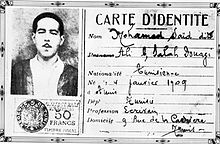Ali Douagi
Ali Douagi | |
|---|---|
| علي الدوعاجي | |
 | |
| Born | January 4, 1909 |
| Died | May 27, 1949 (aged 40) Tunis, Tunisia |
| Occupations |
|
Ali Douagi or Ali ed-Du'aji (
Biography
Douagi was born to a wealthy family of
When the colonial governments eased upon
His Turkish roots and his mastery of the French language, as well as his
Douagi's most lasting contribution to Tunisian literature, as well as pan-Arabic literature, are his short stories that were collated and published in 1969, twenty years after his death, into a single anthology entitled "Shirtu minhu el-lyeli" ("Sleepless Nights, 2000").[6] On May 27, 1949, Douagi died of tuberculosis.[7] According to many accounts, he was abandoned by many of his friends and harboured bitter disappointment for not being recognised for his work.[7] However, on the tenth anniversary of his death, Zin el-Abidin es-Sanusi published an article entitle "Ed-Du’aji’s Legacy" which resurrected critical inquiry and public interest in his work. Al-Sanusi reported that Douagi had written in his 163 radio sketches, and that his heirs discovered 60 more among his affects. He also wrote 15 plays and composed nearly 500 songs and poems.[8]
The Ali Douagi Prize (Prix Ali Douagi) for a novel is awarded at the Tunis International Book Festival (Foire internationale du Livre de Tunis).[9][10] The Derja Association also awards an Ali Douagi Prize for the best work written in Tunisian Arabic ("derja"), in reference to Ali Douagi's use of vernacular in his plays and the dialogues of his short stories.[11] This has caused confusion and some have criticized the Derja Association for choosing the same name as the more prominent prize.[12]
Selected works
- Shirtu minhu el-lyeli (Sleepless Nights)
- Jeri (My neighbour)
- Maotou El Am Békhir (The death of the Uncle Bekhir)
- Nozha Raïka (Luxurious walk)
- Omm Hawwa (Eve's Mother)
References
- ^ a b c d Granara 2010, 79.
- ^ a b Toute la Tunisie. "Ali Douagi". Archived from the original on 2012-07-17. Retrieved 2012-04-17.
- ^ a b c d e f Granara 2010, 80.
- ^ a b Granara 2010, 81.
- ^ a b Granara 2010, 83.
- ^ Granara 2010, 84.
- ^ a b Granara 2010, 85.
- ^ Granara 2010, 86.
- ^ "Conférence de presse de la 35e édition de la Foire internationale du Livre de Tunis". Misk. 27 March 2019. Retrieved 16 March 2021.
- ^ "Foire Internationale du Livre de Tunis". Cité de la culture. Archived from the original on 21 February 2020. Retrieved 16 March 2021.
- ^ "الكولوك" [Annual Colloquium]. Derja Association. Archived from the original on 2020-06-25. Retrieved 2021-03-16.
- ^ خلف الله, نجم الدين (2021-03-11). "في الاستيلاء على الدوعاجي.. تنويع تونسيّ على سجال الفصحى والعامّية" [Co-opting Ali Douagi: Tunisia rehashes the Standard–Vernacular debate]. Al-Arabi Al-Jadid العربي الجديد.
Bibliography
- Granara, William (2010), "Ali al-Du'aji (1909-1949)", in Allen, Roger (ed.), Essays in Arabic Literary Biography: 1850-1950, Otto Harrassowitz Verlag, ISBN 978-3447061414.
- Giuliano Mion, Notti in bianco سهرت منه الليالي, Ulrico Hoepli, Milan, 2012, ISBN 9788820351212
